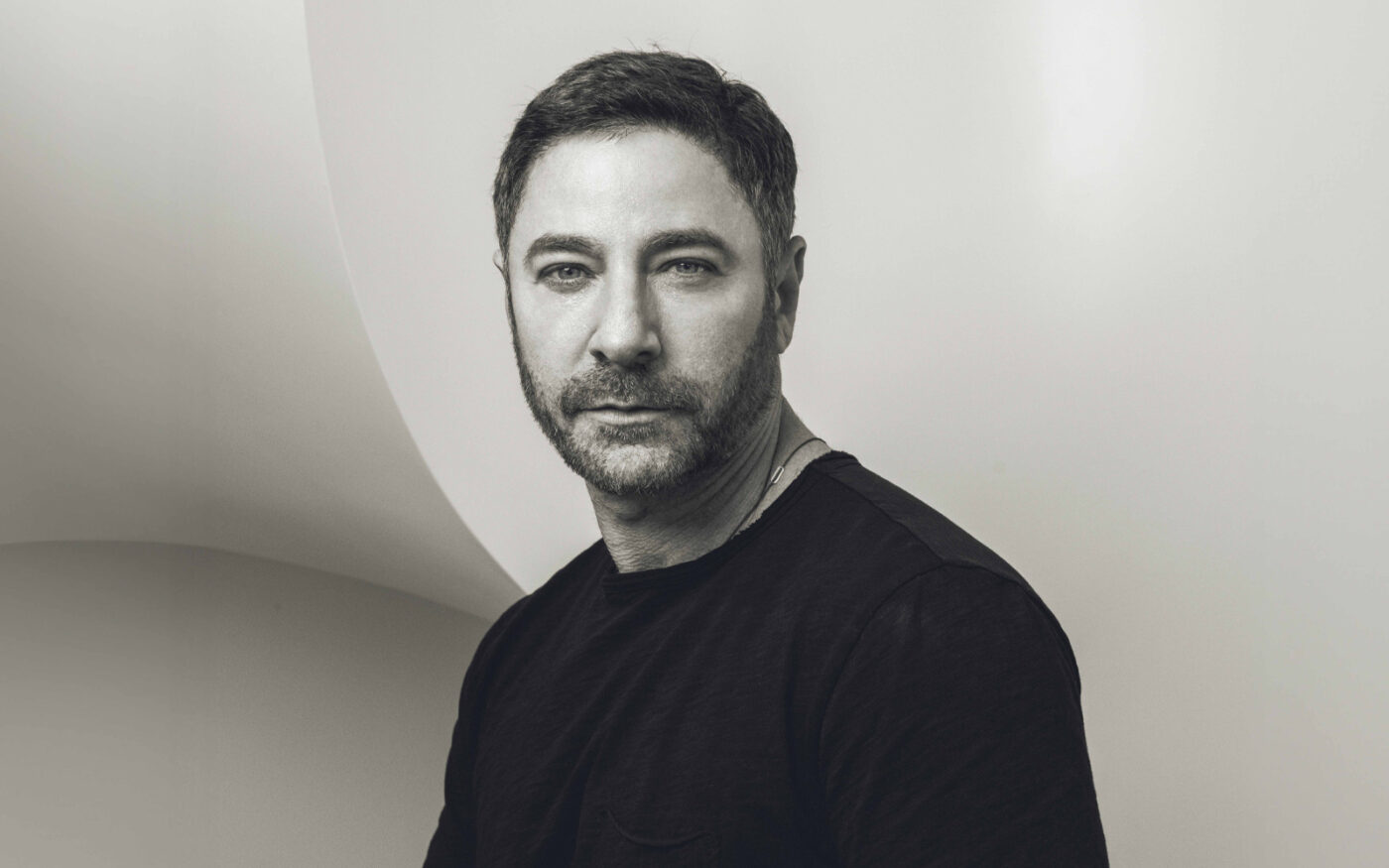The Closing: Aaron Kirman
Los Angeles’ top residential broker talks about overcoming dyslexia, avoiding "commission breath" and breaking into real estate by breaking (and entering) into mansions

Los Angeles’ top residential broker cuts a casual figure, but wants you to know things are getting serious with his new venture.
Aaron Kirman, who’s known for spinning trophy properties while sporting T-shirts and jeans, made headlines in late 2022 with news that he was establishing his own brokerage in partnership with AKG Christie’s International Real Estate.
“We’ve just begun,” said Kirman, who topped The Real Deal’s 2023 rankings with $1.1 billion in on-market sales.
He’s added some top names to his team so far, scooping up Cindy Ambuehl, ranked 16th on TRD’s 2022 list of top Los Angeles brokers with $268 million in sales volume and Joe Babajian, a top L.A. agent in the 1990s and 2000s whose career was derailed by scandal (but Kirman calls one of the best agents he’s ever met).
Kirman balances developing a brokerage with his forte: Selling homes. Bullish on Los Angeles, with aspirations to expand across Southern California’s luxury scene, Kirman sat down with TRD to break down leveling up, the new definition of luxury and why he can’t watch real estate reality TV.
This interview has been edited and condensed for clarity.
Born: Sept. 24, 1978
Hometown: Los Angeles
Lives: Los Angeles
Family: Husband
What were you like as a kid?
I had a really bad speech impediment. I couldn’t say the letter R. I also had severe learning disabilities, severe dyslexia. So my younger years were not so easy. I couldn’t read, I couldn’t talk. On top of it, I knew I was gay at a young age, and that had something to do with my self-confidence.
What’s your earliest memory of real estate?
My parents couldn’t afford to move, but when I was about 10, I said, “Mom, let’s go look at houses.” I forced her to call a fancy real estate agent in the area, and I remember being in her Jaguar looking at houses.
Around the age of 16, I would break into mansions I knew were empty, because I wanted to see what was inside. I wanted to feel it, and I wanted to be part of that world.
How did you translate the home visits into getting legitimately involved in the industry?
As a teenager, I still had really bad dyslexia and couldn’t hold a job. People liked me, but I made too many mistakes.
I was hired by this guy, Alan Long [Legittino, formerly of DBL Realtors], to be an intern at his company. I got fired from that because, of course, I made mistakes.
The minute I got my license, I kind of flourished. The minute I was not working for somebody and had to take responsibility, it was meant to be.
“When Russia was the big money here 15 years ago, I was in Moscow, I was in St. Petersburg, doing tequila shots with an oligarch.”
What was your first deal?
A small little house in the Valley for like $200,000. I did what everyone else did, I hustled and sold one, then sold two.
What did you spend your first big real estate check on?
Even when I was poor and I didn’t have a whole lot of money, I always chose to live really well.
When I was 17, I went to my mom and said, “I’m gonna go into real estate. No one’s gonna take me serious because I’m too young to begin with. I need a Mercedes, and I need a nice one.”
She thought I was crazy. But she figured out a way to get me a Mercedes.
As I started getting a little bit more money, I would always get the newest, nicest car. But I lived with my mom until I could buy my first condo.
A car feels like a very Los Angeles answer.
It’s different for different people. Once you reach a certain level of success, you no longer have to do it. When you’re young, people don’t take you that seriously unless you have the right look.
You came up with the rise of social media. What has that done in your career?
When social media first started, I dismissed it. But one time I was on a plane with a billionaire who was 78 and on Facebook at the time. I’m like, “Oh, my goodness, if this guy is on, I need to embrace it.”
At one time in this business, it was who you knew and who you had access to, and that’s it. Today, I teach that we can get to anyone in the world through social media.
It is an added layer of time, energy and money. To do it right is very time-consuming.
But you feel like you’re still getting return on investment there?
Absolutely. It’s an integral part of brand and keeping in alignment with your buyers and your sellers. Also, as a broker-owner, it’s great for recruitment.
You founded the Aaron Kirman Group under the Compass umbrella in 2018. What’s it like building a team with your name on it?
I made so many mistakes. We brought on 50 people our first year, and they were the wrong 50 people. I remember losing a lot of money.
Now I know somebody’s gonna be successful pretty quickly. Half of my assistants are top producers, some of them are selling hundreds and hundreds of millions of dollars a year.
You have three offices now, and sounds like plans for more. How are you mapping where to go next?
We’re not quite there yet. Our goal is to dominate Southern California luxury. So we’re gonna be in all the markets where luxury exists, where there’s room for new entrants. People are tired of the old companies, they’re tired of Compass, tired of Coldwell, tired of Berkshire [Hathaway HomeServices].
Speaking of the new wave, you joined the ever-growing population of real estate agents to venture into reality TV with “Listing Impossible” in 2020. How was that?
All the shows out there now are all about showing fancy houses and people and pretending like we live these glamorous lives making hundreds of millions of dollars. I wanted to show the real life of what we do every day. The stories we did were hard stories; there were people losing a ton of money on houses that were impossible to sell. We documented that. People can get really rich in real estate and make a ton of money, and people can also lose their shit.

Do you keep up with any of the real estate shows?
I can’t watch it on my off time. A, a lot of them are not real. B, a lot of it is like fakely put together and C, it’s like watching a bad version of my real day.
I honestly would rather eat razor blades. No offense to “Selling Sunset” or Jason [Oppenheim.] Just the thought of having anybody in real estate in my bed freaks me out.
How do you take a break?
It’s a week off. But I never just take a vacation. Anytime I take a trip, my husband and I are working. We are meeting developers, we are meeting builders, we are meeting clients, and it makes me a ton of money. Not only is the trip paid, but I make a big check along the way.
On top of building those relationships, how early do you typically get involved with a new project?
The earlier the better.
Nothing drives me more crazy than bad houses. I hate them. A lot of time, securing the good houses means I have to be somewhat involved in the architectural process, studying the floor plans, the design.
How do you evaluate an aspirational property?
I always do my best to figure out who the buyer is. I always do this completely fake story of what that person or people are looking for.
But sometimes people surprise you. I once listed a house, thinking someone in their 30s or 40s with a lot of money is going to buy. I sold it to an 86-year-old.
The One was a big property that made headlines early on, all over the world. How did you get involved, and did you know what you were getting into?
That house was really tricky. I was honest, I was sincere about that — I told [developer Nile Niami’s ex-wife] Yvonne, and she bought in. Eventually, though, we were all hired by Nile Niami, and that didn’t work out. He wasn’t a seller, and then it went to a trustee. We pushed the trustee because the house wasn’t going anywhere. There was too much conflict with too many owners. The trustee fired us after we had fought to get them higher. We were devastated. We had already worked on it for like a year and spent a lot of money. Eventually that trustee got fired. So we were fired twice before we even got to market.
There was a new trustee, and I remember telling my partners at the time, “Don’t go in with all the history. Let’s just go in with the here and now.” That trustee hired us and turned out to be an amazing business guy. I pitched the auction strategy because I knew it was going to be a complicated sale, so we wouldn’t have to worry about contingencies and all the liabilities.
I’m proud of it. It might have been a disappointing number for some of the investors, but the house had no certificate of occupancy and needed $50 million worth of work.
You really emphasize marketing and branding. What was it like thinking about that outside image through such a turbulent process?
Just another day at work. I love marketing and advertising and I love media, where you can tell stories. In order to sell houses, we also have to tell the story of the house.
I can never guarantee an outcome because I don’t know what a house can sell for. But I can guarantee I’m going to bring it to all the right people, and that’s going to determine the destiny of that sale.
“People smell what I call commission breath. When you have it, nobody wants to be part of that.”
How do you bring it to all the right people?
They’re relationships. Part of my history was figuring out where wealth is. I always called myself a wealth curator. I have always chased the wealth. And when wealth is coming into the United States, I’m at the forefront. When Russia was the big money here 15 years ago, I was in Moscow, I was in St. Petersburg, doing tequila shots with an oligarch.
How are you making the jump to a new stream of wealth or client you don’t already know?
I usually know a connector. So I know one person who will lead to the next, to the next. Not to sound arrogant, but I always tell my clients there’s really nobody in the world that I can’t get access to.
We hear a lot from brokers who, you know, would target events like F1 races.
I don’t do that. I’m not that social, and I feel like sometimes I’m a little awkward in a room. I’m about intimate settings and taking somebody to dinner. So I stay away from Formula One, but I’ll call the people that run Formula One when it’s not happening and try to get to know them in a different way.
Have you ever had to get creative to get in contact with somebody?
You’re not going to get to that guy that manages $80 billion if you don’t have a connector. Sometimes connections happen by just living life. Some of my best connections, I was not trying to get business. I was at the gym, I was eating, I was on Air France.
If you’re looking too much, people smell what I call commission breath. When you have it, nobody wants to be part of that.
You embrace the casual approach, jeans and a sweater. You’re not a suit guy.
If I could wear sweats every day of my life, I probably would.
When I was 18, in my first real estate interview, the interviewer told me, “You might want to not wear those jeans again.” I think they were a little baggy. It kind of hurt my feelings at the time, but I moved on.
Do you see that translate to real estate or the type of money you’re working with?
The days of those glossy white marble showcase houses are done. People want simple, beautiful, elegant.
Yeah, I think “Succession” kicked off this term, but it sounds like quiet luxury has made its way into the real estate market.
There’s reasons for that, right? The world has changed. People don’t like to show off any more. I think luxury has evolved into something that’s bigger and better than it was.




